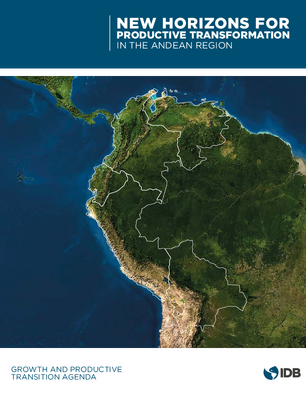New Horizons for Productive Transformation in the Andean Region
Date
Jan 2023
Developed and emerging economies, as well as the international context within which they interact, have faced and are facing events, such as climate change, digitalization, and the COVID-19 pandemic, that are structurally transforming their production processes. The Andean countries are no exception and there is an urgent need for their governments to make policy decisions to address this situation. If steps are not taken, there will be serious consequences for the incomes of those countries.
Many sectors have been affected and also benefited from the pandemic. It is essential to address the challenges in the agricultural sector, especially those that contribute to its low productivity. It should be noted that, despite the challenging environment, this sector has grown. The repositioning of global value chains highlights untapped opportunities in the Andean region. In addition, the services sector, the main employer in the Andean economies, has been strongly impacted by the pandemic. On the other hand, the extractive sector was grappling with major challenges, even before this transformation process. This is happening in a context where, despite some growth, digitalization is still lagging behind. Moreover, the region has been characterized by high levels of inequality, which represent an additional challenge in a transition that will have considerable social impacts.
The scenario described above offers opportunities for the region but requires a major public policy coordination effort. The region faces the task of diversifying and this publication presents recommendations in this regard. In reviewing the sectors mentioned above, it is essential to address the challenges of the agricultural sector, particularly those related to its low productivity. There are opportunities to integrate into global value chains; the Andean countries can make better use of existing trade agreements, seeking to reduce trade costs. It is worth mentioning that the region has room to take advantage of the transformations taking place in the services sector. Although there are significant challenges for the extractive industries sector, there are also opportunities to use this sector as a lever for productive transformation. To achieve this, it is necessary to promote business digitalization and make it easier for companies to decide which digital technologies to implement and how to do so. Finally, any productive transformation strategy must generate opportunities for the entire population. Fostering more-diverse and inclusive sectors of the economy is not only more equitable and fair, but also more profitable.
Many sectors have been affected and also benefited from the pandemic. It is essential to address the challenges in the agricultural sector, especially those that contribute to its low productivity. It should be noted that, despite the challenging environment, this sector has grown. The repositioning of global value chains highlights untapped opportunities in the Andean region. In addition, the services sector, the main employer in the Andean economies, has been strongly impacted by the pandemic. On the other hand, the extractive sector was grappling with major challenges, even before this transformation process. This is happening in a context where, despite some growth, digitalization is still lagging behind. Moreover, the region has been characterized by high levels of inequality, which represent an additional challenge in a transition that will have considerable social impacts.
The scenario described above offers opportunities for the region but requires a major public policy coordination effort. The region faces the task of diversifying and this publication presents recommendations in this regard. In reviewing the sectors mentioned above, it is essential to address the challenges of the agricultural sector, particularly those related to its low productivity. There are opportunities to integrate into global value chains; the Andean countries can make better use of existing trade agreements, seeking to reduce trade costs. It is worth mentioning that the region has room to take advantage of the transformations taking place in the services sector. Although there are significant challenges for the extractive industries sector, there are also opportunities to use this sector as a lever for productive transformation. To achieve this, it is necessary to promote business digitalization and make it easier for companies to decide which digital technologies to implement and how to do so. Finally, any productive transformation strategy must generate opportunities for the entire population. Fostering more-diverse and inclusive sectors of the economy is not only more equitable and fair, but also more profitable.




